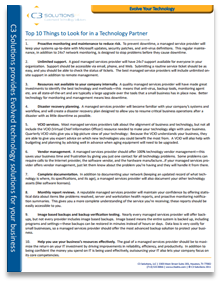Last week, we discussed how healthcare providers can improve EHR software performance by making sure you are supporting it with a strong Internet connection and solid hosting. What we didn’t discuss is, what if your hosting provider is unable to provide you with the resources you need for your EHR to run smoothly?
If you tested your software and it turns out it isn’t the issue (it runs fast while locally installed), or your current provider was unable to adequately address your concerns, it may be time for a different hosting provider.
We hate to say it, but it’s always possible your hosting provider just doesn’t know what they’re doing. It’s relatively easy to throw up a hosting server, host applications and give people the logins. But it’s hard to do correctly. The advent of the cloud makes it possible for anyone to resell server space in a data center that they never actually see in person. And with EHR, the software isn’t proprietary. A variety of providers offer EHR software hosting.
Even if your hosting provider is knowledgeable, it could just be that they aren’t the right fit for your practice. Smaller operations just may not have the resources to relocate or establish a new data center just to improve your connection speed. Without a critical mass of clients with the same need, it’s impractical for them to do so, and it may be time to find one closer to your location.
Whatever the reason, if you are looking for a new hosting provider, be sure to ask the following four questions to make sure they can provide you with the connection you need.
1. Where is the data center hosted?
Remember: the closer the data center to you, the better. Because your data travels over the cables of the public internet, the closer you are to the data center, the faster the connection. This matters with applications as large as EHR, which have huge databases and transfer large amounts of data. Seek out providers with a regional presence and local data centers.
2. Is it private?
Does the provider own space in their own data center, or are they leasing space from a managed cloud company like Rackspace or Amazon Web Services? Anyone can buy servers on a third-party cloud without ever physically seeing or touching them, and then resell that capacity. Performance is going to be degraded when utilizing public cloud services. Some providers do host on the public cloud, but you can expect better performance from a privately owned and operated data center.
3. Ask about resources on the server.
Will your EHR be hosted on your own database server, or will it be shared with other offices? How many companies are on the same server? Servers hosting EHR will typically host software for twenty to thirty offices. If the servers have proper resources, this shouldn’t be an issue, but ask about investing in a dedicated server just for your software.
4. What is the response time in the Service Level Agreement (SLA)?
If you have a problem, how long will it be to get in touch with someone and fix the issue? If I you’re unable to log in, how quickly can your provider get on the phone with you and solve the problem? Ask them about their customer service, and then check that information against what other clients say online. Get service guarantees in writing in the SLA, not just vague promises from sales reps.

Does the SLA have “teeth?” In other words, are there repercussions to the provider if they don’t fix the problem? For instance, some may give you a period free service if there are over a certain amount of incidents in a month. Your provider needs an incentive or penalty to enforce quality service, and that’s what your SLA should provide. The industry standard is that if 2 incidents are not met per month, that month is free. You need to be able to hold your provider accountable without needing to threaten to leave, which in many cases, you may not be able to anyways due to your service contract.
Having an IT partner who can help you find the best provider and make sure they are meeting your technical needs can really help. To learn more about what to look for in an IT partner who can help you get more out of your EHR software and your technology as a whole, download our quick guide on Top 10 Things to Look for in a Technology Partner.
